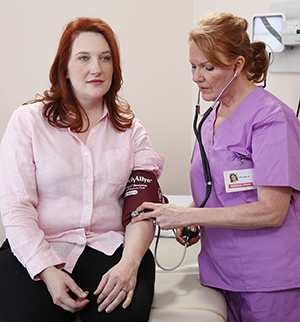Eclampsia After Childbirth
Eclampsia is a condition that causes seizures in pregnancy. But it can also cause them during or after childbirth. Eclampsia is a medical emergency. Your risk is highest in the week after delivery of your baby. It may occur within 1 to 2 days after the birth. But you are still at risk up to 6 weeks after you give birth.
How to say it
ee-CLAMP-see-uh
Who is at risk for eclampsia after childbirth?
You’re at higher risk if:
-
You are in your teens or 20s
-
You are over age 35
-
You had high blood pressure in pregnancy
-
You had preeclampsia or HELLP syndrome:
-
Preeclampsia is high blood pressure (hypertension) that happens during pregnancy.
-
HELLP syndrome is a rare but life-threatening condition in pregnancy. It causes red blood cellsto break down. It's often linked with preeclampsia and eclampsia. HELLP syndrome often develops before delivery. But it may also occur after delivery.
But in some cases, eclampsia can occur without any of these risk factors.
If you have any of these risk factors, your healthcare team will watch your health after delivery very closely. You will be given medicine to lower your blood pressure. You may be given antiseizure medicine, such as magnesium sulfate. If you’re breastfeeding, ask your healthcare provider about the safety of any medicines you’re given.

What causes eclampsia after childbirth?
Healthcare providers aren’t sure what exactly causes it. It may be related to how high blood pressure in pregnancy affects blood vessels in the brain.
Symptoms of eclampsia
In the hours before a seizure, you may have signs and symptoms, such as:
-
High blood pressure
-
Headache
-
Blurry vision
-
Double vision
-
Other problems with vision
-
Confusion
-
Pain in the upper right part of the belly
-
Nausea and vomiting
-
Rhythmic twitching of your ankle when you flex your foot (ankle clonus)
During a seizure, you may have:
-
Sudden loss of consciousness
-
Stiffening of the body for about 1 minute
-
A blue tint to the skin
-
Jerking of the muscles of your body for 1 to 2 minutes (full-body seizure)
-
Froth and bloody spit coming out of your mouth
-
Biting of your tongue
After the seizure, you will sleep for a few minutes. You will wake up within 10 to 20 minutes. You may have a headache or feel confused. Or you may have vision changes. You may not remember what happened.
Diagnosing eclampsia after childbirth
You may be diagnosed with eclampsia after childbirth if you have a seizure but no history of a seizure disorder or signs of another cause. You may have tests to check for signs of another cause. These can include:
-
Stroke
-
A growth (tumor)
-
Infection
-
Low electrolytes
Treatment for eclampsia
If someone can help you during a seizure, they should roll you on your left side. This helps prevent breathing problems. In the hospital, you will be given antiseizure medicine. This is done to help prevent more seizures. This medicine is put into a vein in your arm or hand (IV). Or it may be given as shots in your muscles. You may also be given medicine for high blood pressure for 3 weeks or longer.
Possible complications of eclampsia
Eclampsia may cause a blood clot in the brain (stroke). It may cause bleeding in the brain (hemorrhage). You may need to be put on a breathing machine (ventilator). You may need a blood transfusion. Eclampsia may lead to heart failure or kidney failure. In some cases, it can lead to death.
You may have high blood pressure ongoing after your pregnancy. You may also have a higher risk of heart disease, diabetes, and problems with blood vessels in the brain in the future.
In a future pregnancy, you are still at risk for eclampsia. Your healthcare team will watch your health closely, especially if you have preeclampsia. You are also at higher risk for:
When to call your healthcare provider
Call your healthcare provider if you have any of the following occur:
-
Fever of 100.4°F (38°C) or higher, or as advised
-
Pain that gets worse
-
Symptoms that don’t get better, or get worse
-
New symptoms